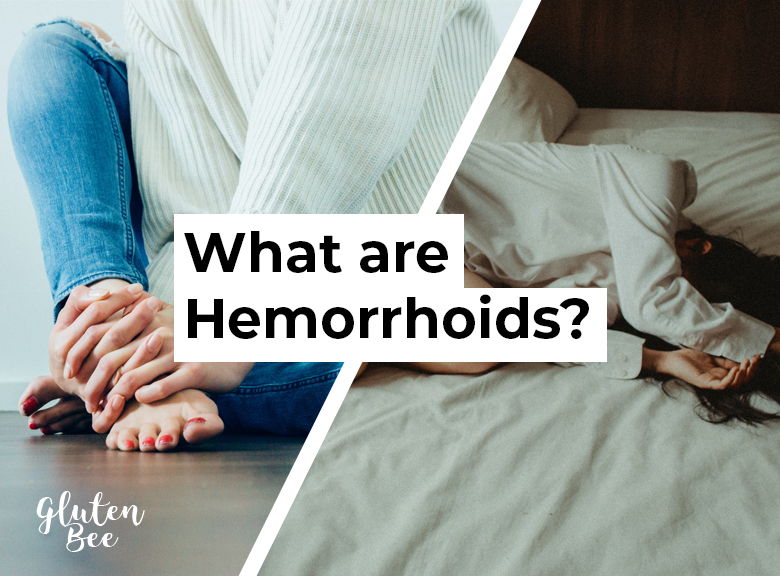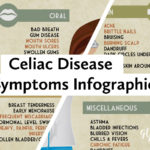If you’ve had digestive issues long enough, you’ve surely dealt with some other unfriendly side effects and issues. One major health issue that affects a lot of people with IBS and other bowel issues is hemorrhoids or piles.
What are Hemorrhoids?
Hemorrhoids are swollen and inflamed blood vessels in the rectum or anus. They can cause discomfort, pain, itching, and bleeding during bowel movements.
There are several factors that can contribute to the development of hemorrhoids, including straining during bowel movements, chronic constipation, pregnancy, obesity, a sedentary lifestyle, and a lack of dietary fiber. Additionally, conditions such as celiac disease or chronic liver disease may also increase the risk of developing hemorrhoids.
How are Hemorrhoids Related to Celiac Disease?
While hemorrhoids are not directly related to celiac disease or a gluten allergy, there are some potential indirect connections:
- Constipation: Both celiac disease and a gluten allergy can lead to gastrointestinal symptoms, including constipation. Straining during bowel movements due to constipation can increase the risk of developing hemorrhoids or worsening existing ones.
- Malabsorption: In celiac disease, the damaged intestinal lining hampers the absorption of nutrients, including dietary fiber. Fiber plays a crucial role in maintaining healthy bowel movements and preventing constipation. The reduced intake of fiber due to malabsorption may contribute to constipation and, subsequently, increase the risk of hemorrhoids.
- Gluten Sensitivity: While celiac disease is a specific autoimmune reaction to gluten, some individuals may have non-celiac gluten sensitivity. In these cases, consuming gluten can trigger gastrointestinal symptoms similar to those in celiac disease, including bloating and changes in bowel habits. These symptoms can indirectly contribute to the development or worsening of hemorrhoids.
- Inflammation: Both celiac disease and gluten sensitivity involve an inflammatory response in the body, albeit through different mechanisms. Chronic inflammation can affect blood vessels and increase the risk of developing hemorrhoids.
It’s worth noting that hemorrhoids are a common condition that can occur in individuals without celiac disease or gluten allergies. Factors such as straining during bowel movements, pregnancy, obesity, a sedentary lifestyle, and a lack of dietary fiber can also contribute to the development of hemorrhoids.
If you suspect you have celiac disease, gluten sensitivity, or are experiencing hemorrhoids, it is advisable to consult with a healthcare professional for an accurate diagnosis and appropriate management of your symptoms. The effects of hemorrhoids can range from mild and temporary, to severe and life-long!
How to Treat Hemorrhoids
The treatment of hemorrhoids depends on the severity of the condition and the symptoms experienced. In many cases, mild hemorrhoids can be managed at home with self-care measures.
However, if your symptoms are persistent, severe, and/or recurrent, it is essential to seek medical advice for a proper evaluation and treatment plan. Here are some general tips for treating hemorrhoids:
- Maintain a Fiber-Rich Diet: Eat a higher fiber diet to soften your stool and make bowel movements more comfortable. This include fruits, vegetables, whole grains, and legumes in your meals. Fiber supplements like psyllium husk can also be beneficial. Considering how common psyllium husk is used in gluten free baking, this is a perfect ongoing treatment option. 🙂
- Stay Hydrated: Drink plenty of water throughout the day to keep yourself well-hydrated. Sufficient hydration helps prevent constipation and aids in maintaining soft stools. The softer your stool, the less painful it will be while dealing with hemorrhoids. This can also speed up the healing process.
- Don’t Strain!: Avoid straining during bowel movements. Straining can worsen hemorrhoids and cause more discomfort. If you have difficulty passing stool, try sitting on the toilet for a few minutes and allowing the body to relax naturally.
- Sitz Baths: Soaking the rectum area in warm water for 10 to 15 minutes a few times a day can help reduce swelling and provide relief from itching and pain.
- Topical Treatments: Over-the-counter creams, ointments, or suppositories containing hydrocortisone or witch hazel can help reduce swelling and alleviate itching. Follow the instructions on the product label and consult with a pharmacist or healthcare professional if needed.

Photo: Nadine Primeau
Living with Hemorrhoids
Living with hemorrhoids can have a major impact on mental health due to the discomfort and pain they can cause. Having hemorrhoids is super lonely too. It’s not easy to tell other people about it, because it’s very taboo. But you can be in a lot of pain for very long periods of time.
Be patient with yourself and take care of yourself. Don’t strain or overexert yourself when you’re having an outbreak.
Chronic pain and discomfort can lead to increased stress, anxiety, and frustration, affecting a person’s overall well-being.
Here are some ways in which hemorrhoids may influence mental health and some strategies to manage it:
- Hemorrhoids can cause constant pain, itching, and a feeling of fullness or discomfort in the anal area. This persistent physical discomfort can take a toll on a person’s mental health, leading to irritability and frustration.
- Hemorrhoids can be embarrassing to discuss and can lead to feelings of self-consciousness, particularly if they cause visible symptoms like swelling or bleeding.
- The pain and discomfort caused by hemorrhoids may interfere with sleep, leading to fatigue and exacerbating feelings of irritability and stress.
- Concerns about when the pain or discomfort might worsen, or the fear of having a bowel movement, can create anxiety and distress.
- Some individuals may avoid social situations due to the discomfort or fear of worsening symptoms, leading to social isolation and feelings of loneliness.
- Hemorrhoids may limit a person’s ability to engage in regular physical activities, leading to a decrease in exercise and movement, which can also affect mood and mental health.
To manage the impact of hemorrhoids on mental health, consider the following strategies:
- Seek Medical Advice: If you are experiencing persistent or severe symptoms, consult a healthcare professional for proper evaluation and treatment. Addressing the physical discomfort can positively influence mental well-being.
- Self-Care: Engage in self-care practices, such as warm sitz baths, using over-the-counter creams or ointments, and following a high-fiber diet to ease discomfort.
- Stay Active: Engage in light physical activities that you can comfortably tolerate, such as walking or gentle exercises. Regular movement can improve mood and overall well-being.
- Talk to Someone: Share your concerns with a trusted friend, family member, or mental health professional. Expressing your feelings can help reduce emotional distress.
- Stress Management: Practice stress-reduction techniques such as mindfulness, deep breathing, yoga, or meditation to cope with anxiety and worry.
- Support Groups: Consider joining support groups for individuals dealing with hemorrhoids or chronic pain. Sharing experiences and coping strategies with others can be helpful.
- Maintain a Positive Outlook: Focus on activities and hobbies that bring joy and positivity into your life.

Photo: Denys Nevozhai
Share your comments below if you have specific tips for people living with hemorrhoids.






